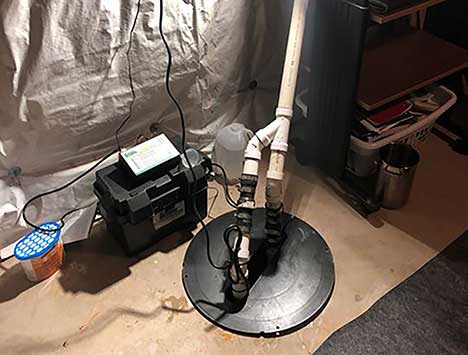
Chicago faces significant challenges when it comes to flooding. The city’s geographic location and weather patterns often lead to heavy rainfall and subsequent flooding, posing a threat to homes and businesses. In this context, sump pumps emerge as a crucial tool in safeguarding properties from water damage. Here we get into the role of sump pumps in providing essential flood protection for Chicago residents, ensuring that their homes and businesses remain dry and secure.
Understanding the Mechanics of Sump Pumps
To appreciate the importance of sump pumps, it is essential to understand how they work. A sump pump is a device installed in the lowest part of a basement or crawlspace. Its primary function is to prevent groundwater from accumulating inside the home. When water levels rise, the sump pump activates and pumps the water away from the property, typically to a storm drain or a designated drainage area.
Sump pumps come in two main types: pedestal and submersible. Pedestal sump pumps have the motor mounted above the sump pit, making them easier to service. Submersible sump pumps, on the other hand, are installed inside the sump pit and are designed to operate underwater. Both types are equipped with a float switch that triggers the pump when water reaches a certain level.
The Role of Sump Pumps in Flood Prevention
Flooding can cause extensive damage to homes and businesses, leading to costly repairs and significant disruptions. In Chicago, where heavy rainfall and melting snow are common, sump pumps play a vital role in flood prevention. By efficiently removing excess water, sump pumps help prevent basement flooding, mold growth, and structural damage.
Moreover, sump pumps provide peace of mind to homeowners and business owners, knowing that their properties are protected from the adverse effects of flooding. This is particularly important in areas prone to frequent flooding, where the risk of water damage is higher.
Installation and Maintenance of Sump Pumps
Proper installation and regular maintenance are key to ensuring the effectiveness of sump pumps. The installation process involves selecting an appropriate location for the sump pit, digging the pit, and installing the pump and necessary piping. It is advisable to hire a professional plumber for sump pump installation to ensure that the system is set up correctly and functions optimally.
Maintenance of sump pumps includes regular inspection and testing to ensure that the pump is in good working condition. Homeowners should check the float switch, clean the sump pit, and test the pump by pouring water into the pit to see if it activates. Additionally, it is important to inspect the discharge line for any blockages or damage.
Backup Systems for Enhanced Protection
While sump pumps are highly effective in preventing flooding, they are not infallible. Power outages, mechanical failures, or overwhelming water levels can render a sump pump ineffective. To address these potential issues, many homeowners in Chicago opt for backup systems.
Battery backup sump pumps are a popular choice, as they can operate during power outages. These systems are equipped with a battery that automatically activates the pump when the primary system fails. Another option is a water-powered backup pump, which uses the home’s water supply to pump out excess water in the event of a power failure.
The Economic Impact of Sump Pumps on Chicago Residents
Investing in a sump pump can have significant economic benefits for Chicago residents. The cost of repairing water damage can be substantial, often running into thousands of dollars. By preventing flooding, sump pumps help homeowners avoid these expenses and protect their property values.
Furthermore, having a sump pump can lower insurance premiums for homeowners. Many insurance companies offer discounts to policyholders who have flood prevention measures in place, recognizing the reduced risk of water damage.

Power outages, mechanical failures, or overwhelming water levels can render a sump pump ineffective. To address these potential issues, many homeowners in Chicago opt for backup systems.
Case Studies: Sump Pumps in Action
Several case studies highlight the effectiveness of sump pumps in protecting Chicago homes and businesses from flooding. One notable example is a residential neighborhood on the city’s west side, which experienced frequent basement flooding during heavy rains. After installing sump pumps, residents reported a significant reduction in water damage and related issues.
Another case involved a small business in downtown Chicago that faced repeated flooding due to its location near the Chicago river. The installation of a sump pump system, along with a battery backup, provided reliable flood protection and allowed the business to operate without interruption during severe weather events.
Environmental Considerations and Sustainability
While sump pumps are essential for flood prevention, it is important to consider their environmental impact. The energy consumption of sump pumps can contribute to a household’s carbon footprint. To address this, homeowners can opt for energy-efficient models that consume less power while maintaining high performance.
Additionally, proper disposal of water is crucial to prevent environmental contamination. Discharge water should be directed to appropriate drainage systems, avoiding areas where it could cause soil erosion or pollution.
Future Trends in Sump Pump Technology
Advancements in technology continue to enhance the performance and reliability of sump pumps. Smart sump pumps, equipped with sensors and connectivity features, allow homeowners to monitor and control their systems remotely. These pumps can send alerts to a smartphone or computer, notifying the owner of potential issues such as high water levels or mechanical failures.
Moreover, innovations in battery technology are improving the efficiency and longevity of backup systems. Lithium-ion batteries, for example, offer longer run times and faster charging compared to traditional lead-acid batteries.
Challenges and Limitations of Sump Pumps
Despite their effectiveness, sump pumps are not without challenges and limitations. One common issue is the potential for mechanical failure, which can occur due to wear and tear, improper maintenance, or manufacturing defects. Regular inspection and timely repairs are essential to mitigate this risk.
Another limitation is the reliance on electricity to operate. During power outages, which often accompany severe weather, a sump pump without a backup system becomes ineffective. This underscores the importance of having a reliable sump pump backup battery installed in place.
Additionally, sump pumps may struggle to keep up with extreme weather events that produce large volumes of water in a short period. In such cases, supplementary flood prevention measures, such as proper landscaping and drainage systems, are necessary to provide comprehensive protection.
Conclusion: The Vital Role of Sump Pumps in Protecting Chicago
In conclusion, sump pumps are indispensable tools in the fight against flooding for Chicago residents. By efficiently removing excess water, they protect homes and businesses from the devastating effects of basement flooding damage. Proper installation, maintenance, and the use of backup systems are essential to ensure their effectiveness.
As technology continues to advance, the capabilities of sump pumps will only improve, offering even greater protection and peace of mind. Through the combined efforts of homeowners, local government, and community organizations, Chicago can continue to build resilience against flooding and safeguard its vibrant urban landscape.
